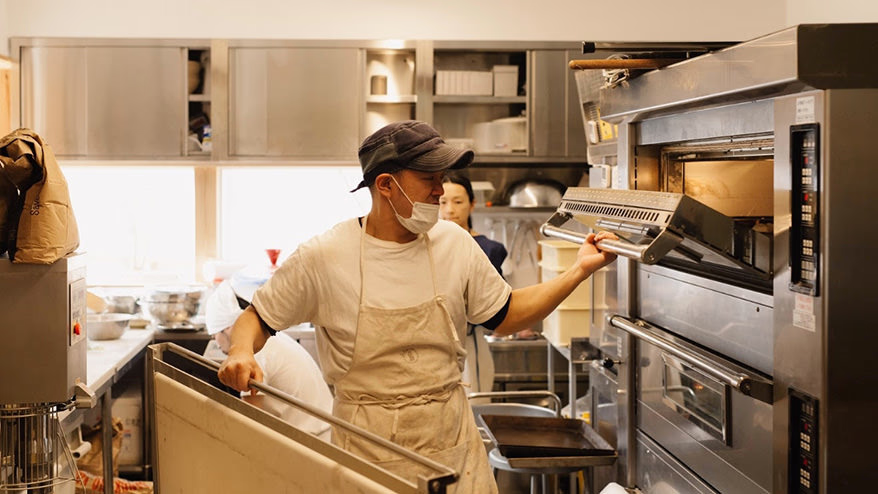徳島県神山町のFood Hub Project(フードハブ・プロジェクト)のかまパン&ストアでパンを焼いている、笹川大輔(33歳)です。出身は東京で、家族で神山に引っ越して2年が経ちました。最近、3人目の子供が生まれたばかりです。
先日、月に1度開催されているモノサスの定例会議に参加して、「ルーティンワークとプロジェクトワーク」についてお話しする機会をいただきました。
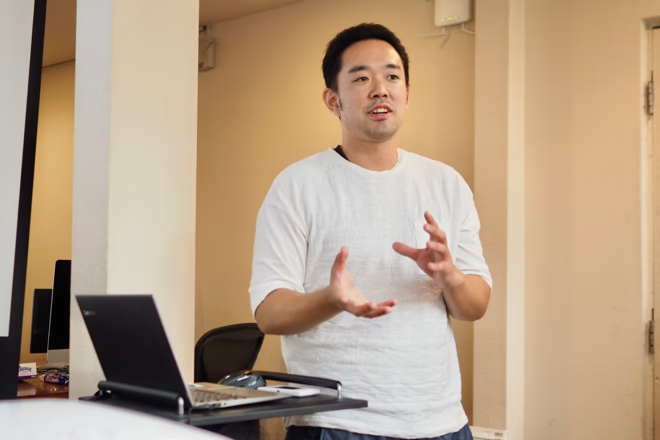
自分がパンを作る上でのルーティンワークとは日々のパンの精度をあげること。プロジェクトワークとは通常のパン作り以外での活動で、外部でのイベントや地域の学校の授業のこと。ルーティンワークはあくまでプロジェクトワークを成功させるためのものであることなどをお話しましたが、そのときに話せなかったこと、さらに伝えたいこと(自分が言いたいだけ)をここで書いていきます。記事にすることで、改めて自分の言葉を整理し、次のステップにしたいと思います。
売るためのパン?
東京で10年近くパン屋で働き、お金とモノの交換だけの関係性や売れるものを作るためにやる仕事という飲食のシステムに疑問を持つようになりました。自分の作りたいパンをつくりたい。しかし考えれば考えるほど自分の店をやることの意味ややりたいことが日に日にわからなくなり、悩む日々が続きます。既存のシステムでしか商売は成立しないのかと考えてたときにフードハブの求人を紹介してもらいました。
フードハブの活動は「地産地食」がテーマで見える関係性を大切にするということ。地域との関わりやパンを通じた食文化をつなげていくということに興味がありました。ここなら今まで抱えていた疑問を解決が出来そう!と思い、神山へ行くことを即決しました。モノサスというWebの会社が関わっているプロジェクトだからこそ、新しいパン屋の仕組みが見いだせるのではないかということが、大きなポイントでした。
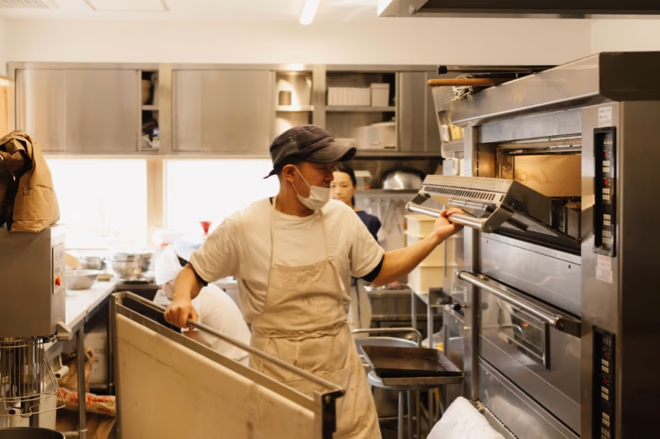
自分が作りたいパンは、その人の暮らしの一部になるパン。今話題のパンとかではなく、その時にある食材を使い、今その時に食べられるパンです。
一方でかまパンで作っているパンは「地域のパン」。それは神山で暮らしている人たちが日常的に食べられるパンです。暮らしの中にかまパンがあるような、毎日食べたくなるパンを目指しています。
パン屋の仕事は毎日、同じようにパンを焼き続けること。そのために毎日、温度や水分量を調整し生地をコントロールしていきます。かまパン開店当初はは決まった完成形に近づくよう、製造方法をはめ込んでいく感じでした。パンが焼き上がるセオリーに沿ってパンをつくる。今思えば、そのときはあまり自分の気持ちが入っていなかったように思います。
フードハブに来てからは、自分の知らなかった製法や種を使うことも多く、設定されていたコンセプトに向けて作り続ける毎日でした。日々変わっていくパンを見て、やり甲斐や楽しさを感じることもありました。
毎日同じことをしているようで、微妙に変化させながら進めていく。日々の工夫がわかる人にはわかるけど、わからない人には普通のパン。しかし、ここでも悩みはつきません。
毎日パンを焼き上げることが仕事ですが、フードハブは立ち上げたばかりの会社ということもあり、パン以外のことを考える時間も多くありました。そうこうしているうちに、僕は自分の仕事、やるべきことを見失いました。
ひとりでも多くの人に食べてもらう
考えなくてはいけなかったことのひとつが、店舗運営で必要不可欠な売上対策のことでした。
「売上いくらたりないの?」「何個つくれる?」「対策は?」「出来ない理由は?」
どこかで聞いた言葉を投げかけられ、「神山でも同じなのか?」と思いました。そんなことはわかっているよ!と言いたくても、言い返せる戦略ややり方が自分から出てこない。話をするほど違和感を感じる日々が続きます。
そもそもWebの会社と関係性があると聞いていたので、分析や戦略を立てるシステムが用意されていて、新しいパン屋の運営ができるものと思い込んでました。
お金とモノの交換、売上のための施策や仕事。また既存のシステムで戦うのかと悩み始めました。自分がやりたいことをするのではなく、売上を取るためや維持するための仕事なのか。そう考えるとこの場所では自分が挑戦したかったシステムへの挑戦が出来ない。いや、自分の力では、パン屋ではその疑問は解決しないのではと真剣に考えはじめました。

そんなことを考えていたときに、東京・代々木上原にある名店カタネベーカリーさんで研修に行く機会がありました。この研修で、パン屋というシステムに対して自分の考えが落とし込めなければ、パン屋を辞めるつもりでした。ここで転機がおとずれます。
事前に考えをまとめておき、研修に入ってからはシェフに疑問に思うことを何でも聞きました。今思えば、何しに来たんだ?パンを見に来たんじゃないのか?と思われたかもしれません(笑)
そのときに言われたのが「まだまだやりきってないよね」「自分の気持ちがお客さんにバレるんだよ」「パンは数でしょ」などの言葉。何も達成も実現もしていないのに、既存システムのなかで文句を言っている自分の甘さを認識させられる言葉を沢山もらい、なんだかスッキリした気持ちになりました。自分が今フードハブでやっていることは、勝手に自分が設定した枠のなかでただこなしているだけで、本当の意味で自分のものになっていない証拠。
「すべては承認されないと意味ないからね、それが出来ないならその席を譲ったほうが良い」
と言われた時に確信しました。まだまだ自分のやるべきことはある。フードハブでパンをつくるのは自分じゃなくても良いと思ったこともありましたが、自分がやりたいに変わったときでした。
神山に戻って具体的したのは、まず作る量を増やしたこと。今まで限界と言っていた食パン100斤を、繁忙期には200斤まで増やし、作り込むことに集中しました。
売上ではなく、こんなにおいしいパンがあるということを一人でも多くに届けたい。自分の気持ちをパンにのせることでお客様に伝えたい。お客様から評価を得ること(売上)で自分が作ることに意味があると思うのです。
私の考えるパンとは人々の暮らしの一部になることなので、神山で実現させたいと考えるようになりました。
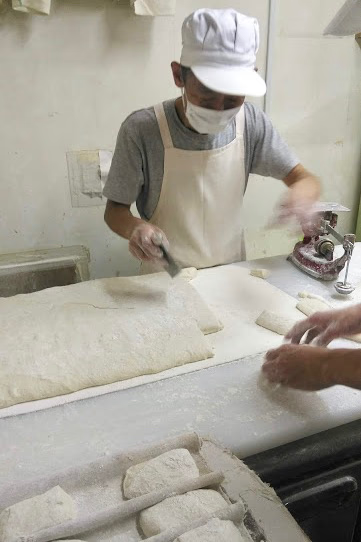
毎日焼くパン、自分がつくりたいパン
カタネベーカリーの研修と同じ頃に、パンとワインのイベントを開催する機会がありました。以前よりやりたいと思っていたことですがなかなか踏み込めずにいたときに、徳島に移住してきたソムリエの方とお会いしたのをきっかけにできることになりました。
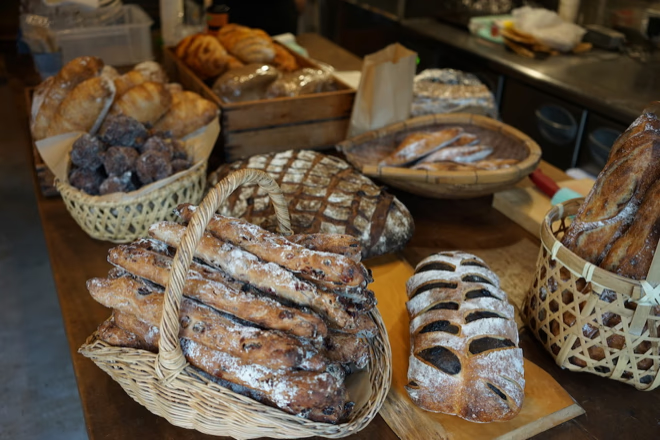
そこでは通常かまパンで出しているパンではなく、自分が素直に作りたいと考えているものを作りました。コンセプトは「自分が食べたいパン」。ワインに合うかどうかも関係なく、ただ自分が思うパンをひたすら作りました。かまパンでつくっている日常のパンではないけど、自分の思いをのせたパン。それは今の自分を写しているような気もしました。技術や考え方が未熟であっても伝えることはできると感じたイベントでした。
そしてこれは自分が毎日焼いているパンにもつながると考えています。ルーティンワークとして毎日焼いてるかまパンの精度をあげることによって、プロジェクトワークとして作る自分のパンも活きてくる。毎日の積み重ねが大切でなんのために作るのか考える機会でもありました。
今は、パンを作り込むことで見えてくる景色があるのではと考えて作り続けています。作り込むことで研ぎ澄まされるような感じ。
これからは東京時代からの目標であった、一人ひとりに合うパンをフードハブでも作りたいと考えてます。以前から、東洋医学のアーユルヴェーダに興味がありました。その考え方を用いると、食べる人の体質に合わせた、ひとつとして同じものがないパンがつくれるのでは?と考えたりもしています。人々の暮らしに寄り添うパンはどうしたらつくれるか。試行錯誤の毎日です。
そんなことできるのか?と言われていますが、とにかくやることが自分の役割だと感じています。これからも、人々の暮らしを豊かにするためにパンを焼いていきます。

